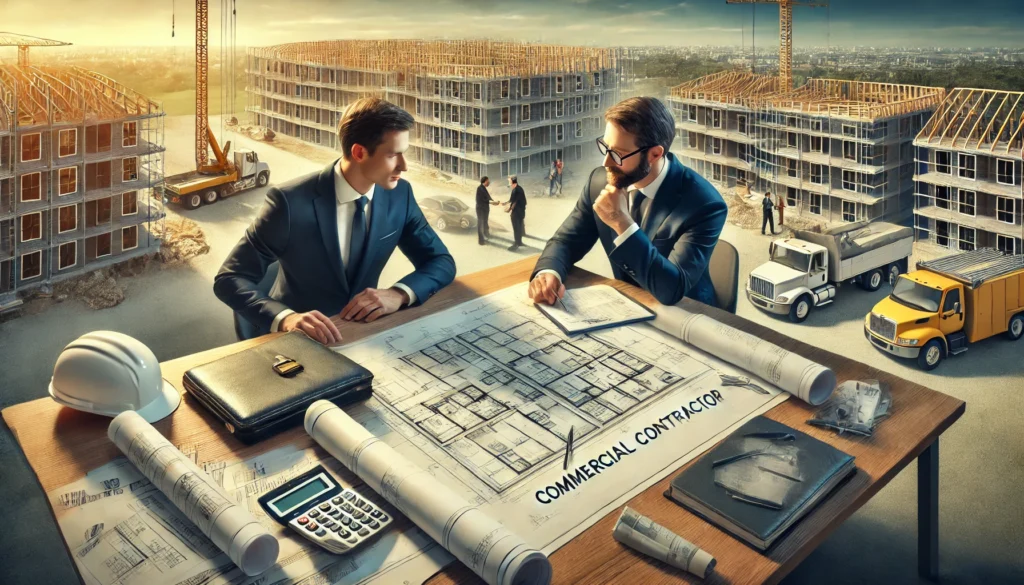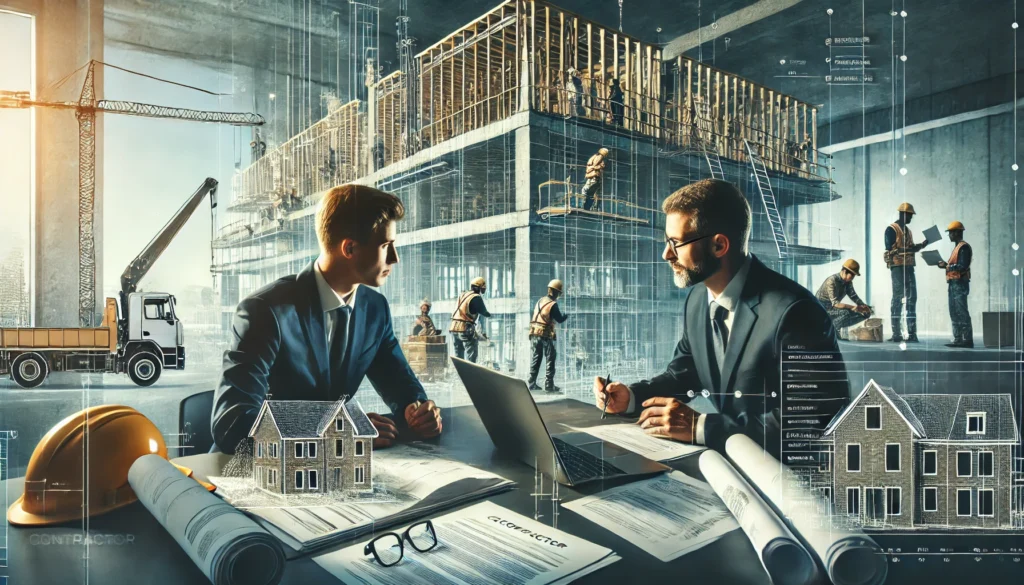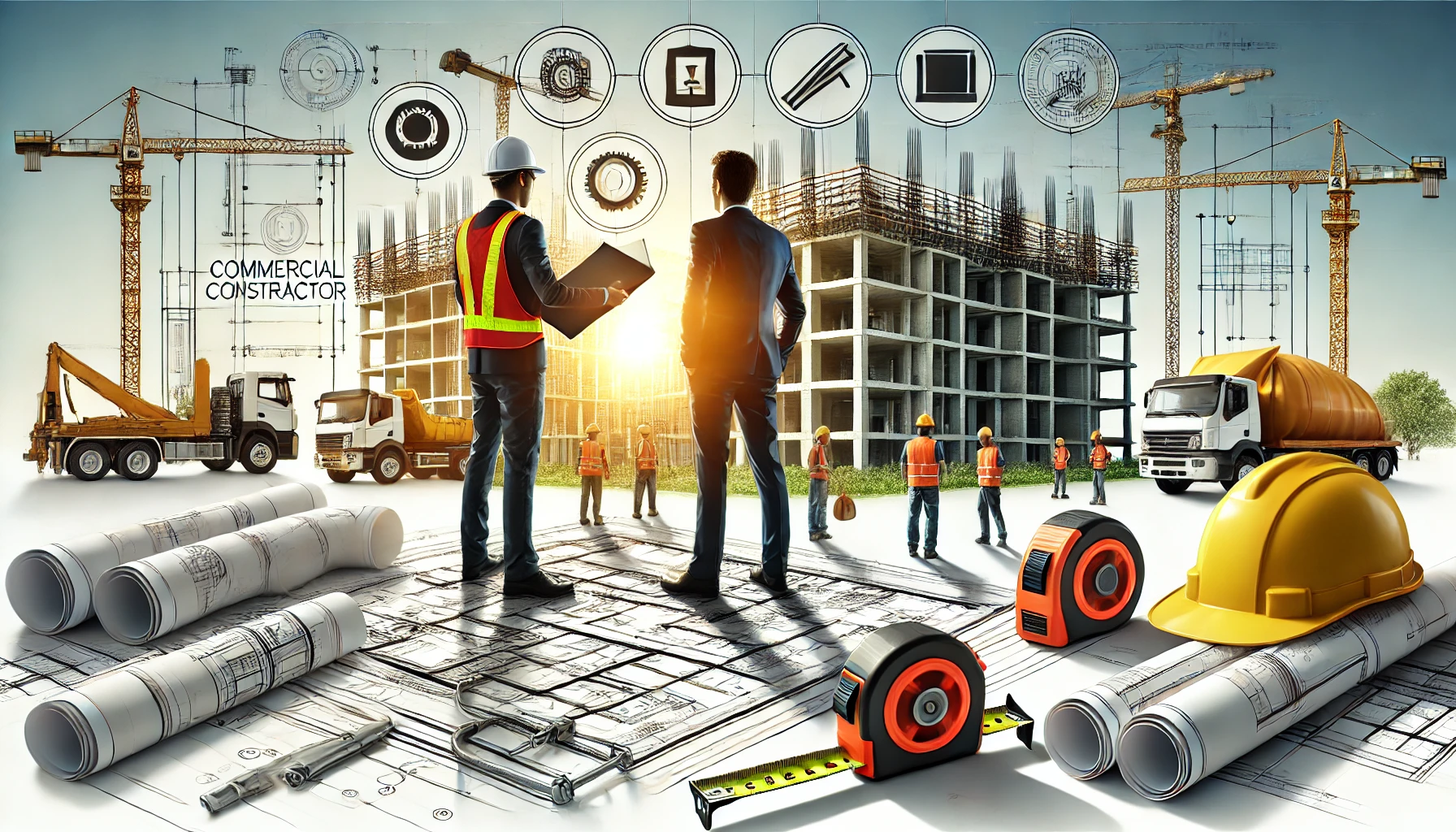Introduction
Hiring the right commercial contractor is a critical step in the success of any construction project. Whether you’re building an office complex, retail space, or a large industrial facility, choosing the right contractor ensures that your project meets all specifications, timelines, and budget expectations. The process can seem overwhelming due to the variety of contractors available and the complexity of commercial construction projects. This guide aims to break down the process, provide tips, and outline essential factors to consider when hiring a commercial contractor for your next big project.
In this article, we will explore the definition of a commercial contractor, how to choose the right one for your needs, the construction process, and how to manage your relationship throughout the project. By the end of this guide, you’ll be equipped with the knowledge to make informed decisions and set your project up for success.
What is a Commercial Contractor?
A commercial contractor is a professional responsible for overseeing and managing the construction of commercial properties, such as office buildings, warehouses, shopping centers, and industrial facilities. Unlike residential contractors who work on private homes, commercial contractors specialize in large-scale projects that require complex design and coordination. They work with architects, engineers, subcontractors, and suppliers to ensure the project is completed on time and within the allocated budget.
One key distinction is that commercial contractors are often responsible for the physical building process and the legal and regulatory requirements. These contractors ensure all construction work complies with local zoning laws, building codes, and safety regulations. Their scope of work can vary, with some acting as general contractors overseeing all aspects of the project. In contrast, others may focus on areas like electrical, plumbing, or HVAC systems.
In addition to technical knowledge, commercial contractors must have strong project management skills to handle multiple teams, manage resources, and keep the project on schedule. Whether building from scratch or renovating an existing structure, a skilled commercial contractor ensures the entire process runs smoothly and efficiently.
How to Choose the Right Commercial Contractor

Choosing the right commercial contractor is one of the most important decisions you’ll make during your construction project. A well-chosen contractor can bring your vision to life, while a poor choice may lead to delays, budget overruns, and quality issues. Below are some key steps to help you select the best commercial contractor.
Identifying Your Project Needs
Before beginning the search for a contractor, clearly defining your project’s scope is essential. Consider the size, complexity, and timeline of your construction needs. Are you looking to build a new structure or renovate an existing one? Understanding the specific requirements of your project will help you find a contractor with the right expertise.
Research and Interview Contractors

Start by compiling a list of potential contractors. You can search online, ask for referrals, or check with industry associations. Once you have a list, it’s time to interview them. Prepare questions regarding their experience, previous projects, licensing, and certifications. Look for contractors who specialize in your project and ask for examples of similar work they’ve completed.
During the interview, pay close attention to the contractor’s communication style, reliability, and enthusiasm for the project. A contractor who listens to your needs and communicates is more likely to deliver on time and within budget.
Verifying Credentials
Before making a final decision, ensure the contractor has the necessary licenses and insurance. Commercial contractors must have a valid license to operate in your area and carry general liability insurance and worker’s compensation to protect both parties during the project. Always ask for documentation and verify these credentials to avoid potential legal or financial issues later on.
- The Commercial Construction Process
Once you’ve chosen a commercial contractor, the next step is to dive into the construction process. This is where your contractor’s expertise comes into play, ensuring that your project is completed on time, within budget, and up to code. Here’s a breakdown of what you can expect during the construction process.
Initial Consultation and Project Planning
The first step is the initial consultation, where you and your contractor discuss your vision, requirements, and timeline. The contractor will gather all the necessary information to create a detailed project plan at this stage. This includes preparing the architectural designs, obtaining permits, and securing the appropriate materials and subcontractors. The contractor will also provide an initial budget estimate based on the project’s size and complexity.
Clear communication is key at this stage. Ensure all your requirements are understood, and don’t hesitate to ask questions if anything is unclear. Defining the scope of work early is essential to avoid misunderstandings later on.
Contract Negotiation and Agreement
Once the details are in place, it’s time to negotiate the contract. This document should include all the terms of the project, such as the payment schedule, deadlines, and responsibilities of both parties. Be sure to carefully review every clause of the contract before signing. A well-structured contract will help prevent future disputes and ensure that you and the contractor are on the same page.
The payment schedule is critical. Commercial construction projects are typically paid in installments, with payments due at specific milestones. Ensure that the payment structure aligns with your budget and that the contractor is clear on when payments will be made.
Project Execution and Monitoring
As the construction begins, your commercial contractor will oversee the day-to-day operations, including coordinating the work of subcontractors, managing supplies, and ensuring that the work meets quality and safety standards. Regular site visits and inspections are essential during this phase to ensure everything is progressing according to plan.
Maintaining open communication with your contractor throughout the construction process is essential. Discuss any concerns and request regular updates on progress, budget, and timeline. If there are any unexpected delays or issues, the contractor should be able to address them quickly and provide solutions.
- Managing the Relationship with Your Commercial Contractor
Establishing a strong working relationship with your commercial contractor can make all the difference in the success of your project. Here are some tips to help you maintain a positive, productive partnership.
Effective Communication
Clear, ongoing communication is the foundation of any successful construction project. Set expectations early on regarding how often you expect to hear from the contractor and what information you want to receive. Regular check-ins and updates are essential to keep the project on track and ensure you’re not caught off guard by delays or issues.
Understand Contract Clauses and Responsibilities
Take the time to understand the terms of your contract thoroughly. This includes knowing your contractor’s responsibilities as well as your obligations. Clarifying payment terms, project milestones, and deadlines will help minimize the chance of disputes.
Handling Issues and Disputes
Even with the best planning, problems can arise during the construction process. If you encounter issues, address them as soon as possible with your contractor. Whether it’s a delay, quality concerns, or cost overruns, open dialogue is key to resolving problems quickly.
Post-Project Considerations
After the construction, you should schedule a final inspection to ensure everything has been built according to the contract specifications. Many contractors offer post-project maintenance services, so it’s worth discussing warranties and maintenance agreements to ensure the longevity of your commercial property.
Conclusion
Choosing and managing a commercial contractor is essential to ensuring the success of your construction project. From the initial consultation and contractor selection to managing the process and final inspections, the right contractor will help bring your vision to life while staying within budget and on schedule. By following the steps outlined in this guide, you’ll be well-equipped to navigate the complexities of hiring and working with a commercial contractor, setting your project up for success.
FAQs
What are the main differences between a general contractor and a commercial contractor?
A commercial contractor typically specializes in larger, more complex projects like office buildings or industrial facilities. A general contractor may handle residential and commercial work but not specialize in commercial projects.
How do I know if a commercial contractor is trustworthy?
Check for proper licensing, insurance, and references from past clients. Visit previous job sites and read reviews online to verify their reputation.
What qualifications should I look for when hiring a commercial contractor?
Ensure they have relevant experience, licenses, insurance, and certifications. Look for contractors with expertise in the specific type of construction you’re undertaking.
How can I ensure my commercial construction project stays within budget and on schedule?
Establish clear communication and set realistic timelines. Regular updates and progress checks will help keep everything on track.
What should I include in a construction contract with a commercial contractor?
The contract should outline both parties’ scope of work, payment structure, timeline, and responsibilities. Make sure all terms are clearly defined.
How do I handle delays or unexpected issues with a commercial contractor?
Address issues promptly with the contractor and seek solutions. Ensure the contractor is committed to resolving problems without significant delays.
Are there any legal requirements or permits I need to know when hiring a commercial contractor?
Ensure that your contractor obtains all necessary permits and complies with local building codes and regulations.
What happens if the contractor doesn’t finish the project as agreed?
Review the terms of the contract, especially regarding incomplete work or penalties for delays. In extreme cases, legal action may be necessary.




